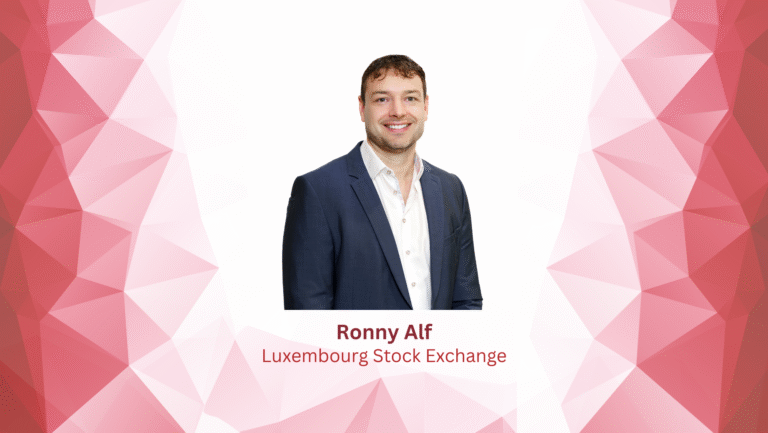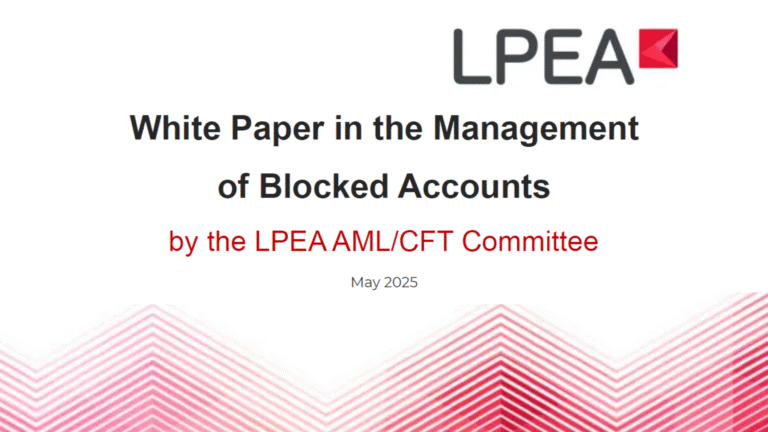Interview of Fabrice Jeusette, Head of Luxembourg Office, Managing Director at Apollo Global Management by Stephane Pesch, CEO of LPEA.
As featured in LPEA Insight/ Out magazine #20, December 2021.
Apollo aims to double its current AuM by the end of 2026, an ambitious goal that the Luxembourg will support. Interview with Fabrice Jeusette, Head of Luxembourg Office, Managing Director at Apollo Global Management.
Stephane Pesch (SP): Hello Fabrice, could you briefly introduce Apollo Global Management, its history and its philosophy?
Fabrice Jeusette (FJ): Apollo was incorporated in 1990 as an alternative asset manager with the ambition of being a contrarian investor. Contrarian meaning going into markets or selecting deals that others would not focus on because of their complexities. It also means being a pioneer on certain strategies as we do with our insurance platform for example, but without deviating from our disciplined investment approach. Since 1990, Apollo has been servicing institutional investors across three different strategies that we called yield, hybrid, and equity. Currently, Apollo employs more than 2000 people, including 550 investment professionals, and is located in multiple countries including the US, the UK, India and Luxembourg. Looking back at our timeline, Apollo was established in 1990, three years later the first real estate fund was raised and in 1995, the third private equity (PE) fund.
SP: Can you say you are pioneers in the field?
FJ: Exactly! After 1995 things started to move quickly. In 2001, the size of the PE Fund V was already USD 3.7 billion, which can be considered a mega-fund for that time. From 2005 the company started opening offices outside of the US – London and Singapore – and continued doing so over 10 years. 2009 saw the creation of the Athene platform, one of the main drivers of Apollo’s growth going forward. In 2011, Apollo was introduced to the New York Stock Exchange and the year after we founded Merx Aviation. That, among others, helped us increase our loan origination business. In 2014, we created Athora, an insurance business, similar to Athene but in Europe. Fund IX came by in 2017 with USD 24.7 billion, which was one of the biggest PE funds ever at the time. Finally, in 2020 we launched our impact investing platform. Overall, since 2011, our public offering and our AuM have grown more than 6 times to reach USD 473bn and we are about to enter a new chapter in 2022 with the merger with Athene.
Apollo was incorporated in 1990 as an alternative asset manager with the ambition of being a contrarian investor.
SP: Could you elaborate a little bit more on the strategies you have highlighted?
FJ: We will double our AuM size between now and the end of 2026 and even if it seems massive, we believe this prediction being somehow conservative. Apollo has multiple ways of achieving this goal and our plain vanilla PE funds will of course be part of the mix, but we think that our main source of growth will come with the insurance platforms Athene and Athora which are a way for us to differentiate ourselves. By merging with Athene, we have access to inexpensive, long-term and predictable capital coming from the policy subscribers. We use this money to invest in multiple of our existing funds which allows us to put significant commitment in our own funds alongside our usual investors, but it also helps us develop dedicated products. We are very focused on being directly at the source – the loan originator. So far, we have succeeded in originating loans at an unprecedented size and covering a wide spectrum of types of financing. This brings us to a specific market where you don’t have many competitors able to originate loans over USD 1bn.
SP: What about your ESG strategy and tools? Is Apollo advancing in these fields as is it a vector for growth?
FJ: For over a decade, Apollo has built a successful ESG program that has been a leader within the alternative asset management industry, working with stakeholders to help drive sustainability, climate action, employee engagement, and responsible citizenship across the firm and its funds’ portfolio companies. Earlier this year, we published our 12th annual report, where we highlighted our most recent developments, including our proprietary ESG rating system for our credit platform, further incorporating ESG into its lending and investment processes. More recently, we have made several key hires, including naming our first Chief Sustainability Officer, Dave Stangis, who will spearhead sustainability efforts across the entire Firm. In addition, we have named Michael Kashani, Head of ESG for Credit and Carletta Ooton, Head of ESG for Private Equity. They join a distinguished group of individuals working on ESG initiatives across the Firm, as we continue to expand our efforts. We see ESG integration as not only the right thing to do but a real driver of value creation.
To that end, we launched our dedicated Impact platform late last year. The platform leverages the expertise of the Firm’s leading private equity franchise and looks to differentiate itself by seeking impact at scale via opportunities in later-stage companies across five key areas: economic opportunity; education; health, safety and wellness; industry 4.0; and climate & sustainability.
Some type of profiles are more complicated to find than others, but overall, I think that we’re doing a good job in finding people in Luxembourg.
SP: What is the footprint of Apollo in Luxembourg today?
FJ: The Apollo Luxembourg office opened in 2011. Since then we grew to 22 employees, 4 secondees and we plan on recruiting an additional 10 people next year. In comparison to some competitors in Luxembourg, our model is to keep on externalizing all the production of accounting, NAVs, tax return and legal compliance to our local services providers. All our employees have a proven level of experience and are in charge of the coordination, organization, and supervision of our activity in Luxembourg.
Regarding activities, Apollo Luxembourg was used by Apollo as a platform for our holding entities and for our investments in Europe, which was a trend back in the past for almost all the players. The changes brought over by new regulations and with Brexit resulted in a very positive impact for Luxembourg. We therefore have now developed several activities including the launch of more than 20 funds, obtention of our AIFM license since January 2019 with the addition of a MIFID top-up license the following year.
SP: That is a significant change…
FJ: Indeed! The mandate of the Luxembourg office has evolved drastically, and it impacted the type of people we employ as well as the nature of activities we perform. Even though we keep on managing the holding entities as well as looking at the different investments from a valuation and risk perspective, we have now entered the new space of client facing and investor relationship. These aspects also lead to other discussions linked to the AIFM Directive such as distributions, marketing, etc.
Luxembourg is Apollo’s primary hub for European investors, European funds, and European investments. The target operating model now states that as soon as we believe a fund will reach, at the global level, a certain target size (e.g. above USD 1bn), a Luxembourg sleeve of this fund will automatically be created as we believe there will be appetite for European investors.
The next step for the Luxembourg office is of course to digest the growth, firstly on an AuM basis; secondly, in terms of number of funds, and finally in the number of holding entities. We expect the growth in Luxembourg to be at least equal to the one of Apollo group.
SP: Are you facing any specific hurdles or constraints for recruitment of personnel in Luxembourg?
FJ: I started working in Luxembourg 17 years ago and I have always heard people say that it was hard to find enough talents to keep the growth pace of our market. That was back in the days when, for example, the Big Four amounted to a couple of hundred people. However, I still hear the same complaints today and I keep on seeing that the overall market in Luxembourg is growing every year, no matter what. So what does that mean? In my view, it shows that Luxembourg is a good environment for the financial market. Even if we always say that it’s hard to recruit, we keep on finding solutions without having a negative impact on the overall quality of the work delivered. It might become a bit trickier than before because we cannot just hire people coming from Luxembourg or neighbouring countries, but I think that this is where the market is somehow synchronized as PE firms like us can rely on lawyers, advisory companies and central administrative agents. These players have different sizes and different recruitment strategies where they can recruit people coming out of universities all over Continental Europe and even further. Indirectly, this is fortunate for us, as once the people have reached a certain level of expertise – these companies being very good training grounds-, we can potentially recruit them. Furthermore, some types of profiles are more complicated to find than others, but overall, I think that we’re doing a good job in finding people in Luxembourg.
SP: You highlighted that in the future you would be more client facing and involved in investors’ relations. Can front office profiles be found off the shelf in Luxembourg? Do they need to be built up or imported?
FJ: I think the back-office role has always been the strength of Luxembourg. So I have never had any specific issues finding people in that area. Now, when we come to new type of functions that were not significantly represented in Luxembourg in the past – notably functions that were performed elsewhere, in the UK, prior Brexit for example – it gets more complicated. Overcoming that issues is twofold. Firstly, people could be relocated to Luxembourg – some of our UK based colleagues have already asked to be relocated here. Secondly, some position will need to be created in Luxembourg at some point. This poses the question: what role can be easily created in Luxembourg? Valuation and Risk come directly to my mind, as again, they originate from the back-office sector. Such role can be boosted up a little bit to evolve from being mainly focused on the regulatory aspect of the function to become more front line oriented. Our partners in Luxembourg, and Big Four’s in particular have such type of profiles and we can benefit from that.
For the deal professionals, one thing to remember is that most of the alternative asset managers were founded in the US or the UK and the investment teams were set-up there which attracted a meaningful number of Europeans. Even if the market is evolving and the asset managers are getting bigger and building more presence internationally, relocating investment professionals or creating local teams needs to be driven by a real desire, need or obligation. Brexit has created in some regards some type of need or obligation to relocate business but: is Luxembourg sufficiently attractive compared to other countries to initiate this move? I think we still have a lot of efforts to produce.
Going forward, our ability as a market to react together to all these new obligations and trying to implement them in a sensible way will be crucial.
SP: What about marketing?
FJ: Regarding marketing, the situation varies from one PE firm to the other. For Apollo, I think that these roles can be created in Luxembourg, but it’s more a question of knowing when we would be ready to do it rather than when Luxembourg is ready for it. Whatever happens, I think Luxembourg has got now a very good opportunity to increase its footprint. As for the UCITs world where Luxembourg was by far the best place for business, I believe the alternative industry is going into the same direction. This is such a fast-evolving environment, which can entirely change over one year. Never take anything for granted as whatever drives us are the new laws and regulations and how the different countries apply them. Having experienced the pandemic and Brexit, it is really important to realize that this is a fast-growing business that needs to have the proper infrastructure to keep on growing. This infrastructure is not just Apollo building it, but it’s also the state, the regulator and the laws that keep on supporting us.
SP: So, Luxembourg: paradise or hell?
FJ: Our business in Luxembourg was largely unregulated when I started, and it’s becoming more and more regulated. This trend does not show any signs of slowing down. It is a normal trend as it also shows that the sector is getting more and more important in terms of market share. As it gets bigger, regulators start looking at you and say “hold on a minute, we need to pay attention to the alternative business”. In the past there were slight regulatory evolutions, so a firm could function with multitasking employees that had a broad knowledge. Nowadays, smooth evolution doesn’t occur anymore, regulatory revolutions can occur from one year to the other. Brexit is a good example of a market revolution taking place over two to three years leading to a complete shift in landscape. Consequently, we are now heading into a direction where we have a market of specialized people. Employees cannot be performing multiple tasks anymore. The business is more complex than ever leading to more complex structures with more substantial requirements and more compliance work needed.
Tax, compliance and AML completely evolved, ESG is a new topic and forces us to rethink the business. I’m not sufficiently knowledgeable of other industries, but I hope for them that they do not evolve as quickly as we do because it’s really draining. We need to be really on our toes, at every moment, to be able to follow the new obligations we have. Apollo is so big and involved in so many different types of businesses that we are impacted by a whole range of evolutions. It remains a trend hard to manage. We are not the back-office operation anymore, we need to grow our own business in this country. To do so we need to ensure that we have the proper support. Support is staffing – which we can manage ourselves – but it’s also our ability to compete with other countries. This is where we need to ensure that it becomes a core focus both for us and for the country.
SP: In order to remain competitive, how should Luxembourg support the alternative industry?
FJ: Since I started working, I had the feeling that Luxembourg was the best place to run this type of business as state bodies understood how it was working and were always one step ahead. When this was not the case, they reacted quickly enough so that the players didn’t suffer too much. The coming major blocking point will however not be country related, but international, with measures that could somehow put a brake on our growth. Going forward, our ability as a market to react together to all these new obligations and trying to implement them in a sensible way will be crucial. This means ensuring that we are at all times compliant with whatever comes up on the market, but also ensuring that we are not pushed the extra mile every single day. Otherwise at some point, this will have a cost and in our business, if we take in too much costs, a cost reward comparison is made. It is therefore necessary to keep our edge.
SP: Any specific example?
FJ: An example I have in mind is a business important for Apollo in the US, which is the SPAC. To start such activity in Europe, multiple points have to be addressed. Firstly, to make it efficient and to make it appealing to investors a good stock exchange is needed. Additionally, you need local competent service providers and the overall support to run this business including weighing the past experience of the country on this specific market. Luxembourg is well placed on some of these aspects but from a US standpoint, our stock exchange could be considered too small and with too little volume compared to some other countries. This issue can be solved by organizing the SPAC here and listing it in another European country but there are also other hurdles to take into account such as the cost of setting up and running the business in one country or the other. Having our European platform in Luxembourg, I am trying to attract this business here but I still have to overcome some local constraints having an impact on the costs. This is a concrete example that underlines that in certain cases you need to make efforts to keep the business where it is or to keep on growing it.




